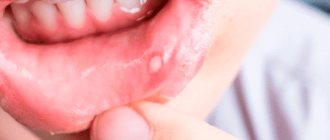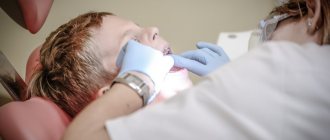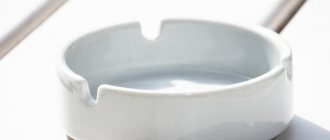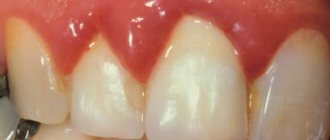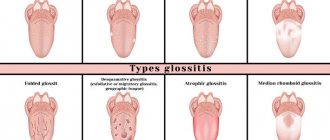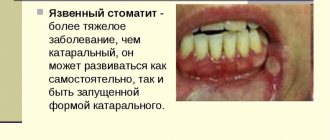There are many oral diseases. The reasons for their appearance may be different. Sores often appear in the mouth. How to treat and what to apply to them to get rid of this unpleasant phenomenon? There are many effective treatments that will be discussed in the article.
Sores in the mouth are a common ailment that most often affects young people and those who have psychological problems and frequent stress. Many people do not pay attention to this, so the ulcers heal on their own in a short time. This is due to the rapid restoration of cells in the oral mucosa. Sometimes wounds lead to discomfort and pain. Then you need the help of a doctor, otherwise concomitant ailments may arise that will worsen your well-being.
Diseases
First you need to identify the causes of sores in the mouth. Treatment will be carried out based on this. This phenomenon may be associated with local diseases of the oral cavity. In this case, the wound will simply be an accompanying symptom that should not be ignored. Diseases that result in sores in the mouth include many ailments.
- With syphilis, ulcers always appear. In the initial stages of the disease, the sores do not cause discomfort and are presented in the form of a small circle with a red bottom. Ulcers that occur with syphilis take 3-12 weeks to heal. But after they tighten, a scar appears in the mucous membrane. During the course of tertiary syphilis, the ulcers are bloody and have a rich color. Such damage takes about 2 months to heal. It is therefore advisable to treat syphilis in a venereology department.
- This may be associated with oral tuberculosis. The course of this disease manifests itself in the form of ulcers that affect the cheeks, tongue and entire mouth. Such wounds do not hurt and visually increase in size over time. Ulcers with this disease are shallow, but loose. They often bleed and have jagged edges. Treatment should be performed in a hospital and under the supervision of a doctor.
- Another cause of sores in the mouth is necrotizing gingivostomatitis. The disease appears due to weakened immunity, trauma to the oral cavity, lack of vitamins, allergies and hypothermia. As the disease progresses, ulcers appear on the cheeks, gums, palate, tongue, tonsils, and arches. The wounds are covered with a yellow or green coating, which leads to bad breath. The sores are shallow, with uneven edges. Often such lesions lead to minor bleeding. Treatment is carried out in a hospital using medications.
- These lesions appear with herpetiform stomatitis. Ulcers with this disease resemble herpes. They are usually found on the tongue and at the bottom of the mouth. They are eliminated within a few days. But if they do not heal on their own, then medical attention is needed.
- Ulcers may appear with recurrent stomatitis. They are found on the tongue, cheeks, palate and near the lips. There is pain and discomfort while eating. To avoid complications, treatment should be performed as soon as the first symptoms appear.
- Sores form in the presence of necrotizing periadenitis. In the initial stages, small compactions are likely to occur, which after some time turn into ulcers. Wounds appear on the tongue, cheeks, lips. It is difficult for a person to eat and talk with them.
You can find out from your doctor how to treat a wound on the oral mucosa. Depending on the disease, medications may differ. Moreover, each medicine has its own dosage and application rates.
Treat or ignore?
According to some experts, treating mouth ulcers is not necessary. If the patient does not have concomitant diseases, for example, diabetes or HIV, then you can ignore them. The erosion will heal on its own within 1-2 weeks.
There is another opinion. It is known that the nature of erosion can be infectious. In this case, the damage will heal, and its causative agent will remain in the human body. Subsequently, with a decrease in immunity, the pathology will worsen again.
Acceptable pharmaceutical products
Only a doctor can tell you how to treat erosions of the oral mucosa with medications. However, many patients are in no hurry to use the help of specialists, because most drugs can be purchased at the pharmacy without a prescription. What medications can be used independently for the formation of ulcers?
- Furacilin is an antimicrobial agent. To prepare the solution, you need to take one tablet, crush it into powder and stir in 100 ml of warm water. You need to rinse your mouth up to 5 times a day. Taking the medicine internally is not allowed.
- Cosmetic and base oils (sea buckthorn, peach, propolis) will effectively cope with pain and accelerate regeneration. They need to be applied pointwise.
- If mouth ulcers are caused by a viral infection, herpes or fungus, then appropriate medications are used. Anaferon, Aflubin, Isoprinosine, Acyclovir will help increase immunity. Nystatin, Fluconazole, Ketoconazole and other remedies will get rid of the fungus.
- Antiseptics Chlorophyllipt and Miramistin are used for rinsing or local irrigation. It is important that these drugs are always effective, because they not only eliminate pathogenic microbes, but are also able to fight viruses, fungi, and bacteria.
- Stomatofit - rinsing solution. With it, mouth ulcers are completely and irrevocably destroyed. The basis of this remedy is medicinal plants.
- Pain relieving gels Kamistad, Cholisal are safe drugs that are used even to treat children. Lubricating ulcers with them allows you to quickly and effectively relieve pain. You can use them before meals to eliminate discomfort.
Before treating a mouth ulcer with medications, you should carefully read the instructions for a particular drug. It is even better to consult a doctor first.
Folk recipes
Mouth ulcers usually heal on their own, but the recovery period can be significantly shortened. If erosion is not treated, it lasts an average of 14 days. When using proven recipes, this period is reduced by 2-2.5 times.
- Soda rinses. If mouth ulcers are infectious in nature, an alkaline solution will help. It is especially effective for fungal infections. To prepare the solution, you need to stir one teaspoon of powder in a glass of boiled water. The liquid should have a comfortable temperature. Rinsing is done daily, several times (the more, the better).
- Calendula is an effective healing, analgesic and anti-inflammatory agent. To prepare the decoction, add a tablespoon of dry herb to a glass of boiling water. When the solution has cooled, it must be filtered and then used for rinsing several times a day.
- Agave (aloe) or Kalanchoe are plants that most people have. They have antiseptic and anti-inflammatory effects. It is necessary to cut a piece of the leaf, cut it lengthwise, and then apply the cut to the damaged mucosa.
- Carrot juice in combination with cabbage juice gives a regenerating and disinfecting effect. Only freshly prepared product should be used. After mixing the ingredients in equal proportions, keep the juice in your mouth for several minutes.
- Garlic and onions are natural antibiotics. With regular consumption of these products, the ulcers will heal much faster. It is important to remember contraindications: such products are prohibited for people with gastritis and individual intolerance.
- Basil leaf can significantly speed up the restoration of damaged surfaces. It must be chewed slowly. An additional dose of vitamin C will increase the body's overall resistance and reduce the likelihood of relapse.
- Fruit juices can speed up regeneration. It is acceptable to drink whatever the patient likes. Freshly squeezed juice improves immunity and fights infectious diseases. You should not drink juices in their pure form if you have stomach and intestinal ulcers. In the presence of such diseases, the drink must first be diluted with water in equal proportions.
- If erosions in the mouth cause pain, how to relieve the condition? Lemon juice will help dull discomfort and eliminate unpleasant sensations. A small amount of citrus is applied to the damaged area. It is not recommended to drink or eat immediately after this.
- Honey and yarrow juice are mixed in equal proportions. The medicine is taken orally, 3 teaspoons for three weeks.
The lack of effect from traditional treatment should prompt a person to use medications.
How else can a sick person help himself?
If mouth ulcers appear, treatment at home should begin with changing your daily routine. Everything should be reviewed: from sleep and nutrition to self-care methods. To help yourself, you need to follow simple rules:
- Stick to a special diet. It is known that the sore can be irritated by carbonated drinks, solid foods, as well as pickles, smoked foods and spices. You should avoid eating such products for at least a week. As soon as the erosion heals, you can return to your usual food.
- Eat food at a comfortable temperature. Hot food can cause burns and ulcers. Therefore, it must first be cooled to a temperature of 60-70 degrees. The same applies to tea, coffee and other hot drinks.
- During the treatment of oral erosions, it is necessary to eat soft foods that will not cause re-injury. The patient should choose pureed dishes, boiled porridge, soufflé. It is better to prepare food by baking, steaming or boiling. Fried foods are excluded during therapy.
- Do cold irrigation. Before each meal, it is recommended to rinse the oral mucosa with cold water . This method will reduce pain, as a result of which the patient will be able to eat fully without experiencing discomfort. People with recurrent sore throats and increased tooth sensitivity should not resort to this method of self-help.
- Keep your mouth clean every day. Regular brushing of teeth with a soft brush and rinsing with cleansing lotions is necessary. When outside the home, cleansing foams and sprinklers should be used. It is advisable to carry out hygiene procedures after each meal. This way you can reduce the number of bacteria that form and prevent the risk of complications.
If you follow these simple rules, then sores that have formed on the oral mucosa will heal much faster. Additional treatment with folk remedies will further speed up the process.
Injuries
The appearance of mouth ulcers can be associated with traumatic factors, for example:
- When brushing teeth is done incorrectly.
- Cracks in the soft tissues appeared after the bites.
- Improper sanitation of the oral cavity.
- Poorly installed dentures, crowns, and braces.
Injuries are also a common cause of ulcers. How to treat a wound in the mouth after a bite? In this case, it is enough to eliminate the factors listed above to improve the condition of the oral cavity.
How to treat stomatitis and mouth ulcers. What symptoms appear first?
Such an unpleasant disease has one advantage. It is easy to distinguish from other sores. A dental therapist will help you with this. Therefore, if you experience symptoms, hurry up and consult a specialist. Delaying treatment will lead to the transition of stomatitis to a more acute form.
Main symptoms:
- Appearances on the mucous membrane: redness, pale spots, ulcers.
- Acute pain in the mouth, namely: on the cheeks, gums, tongue, larynx.
- Unpleasant burning and dryness.
- White coating on the tongue.
- Fever and weakness.
- Enlargement of lymph nodes.
- Swelling and redness of the mucous membrane.
- Ulcers appear in the mouth that are filled with fluid.
Don't be alarmed by the appearance of a black ulcer in your mouth. But it is necessary to see a doctor as quickly as possible. It indicates an acute form of stomatitis. Wounds often appear on the palate. They are quite painful and burn strongly when swallowing or chewing food.
Having learned the first symptoms, many ask the question “how to treat stomatitis in the mouth?” — the entrance includes external remedies and drugs that will help get rid of the disease. Moreover, the most unpleasant way to treat stomatitis, although quite effective, are home methods. By the way, they are prescribed by a large number of specialized specialists. Read about traditional treatment methods below. Let's talk about the types of stomatitis?
Other reasons
Ulcers also form due to:
- taking medications;
- acidic foods that irritate the oral mucosa.
If for these reasons a wound appears in the oral cavity, how to treat it? In this case, you need to be careful when choosing medications, products and hygiene products (toothpastes, mouthwashes). Only a doctor can accurately identify the cause. Based on the diagnosis, the specialist will tell you how to treat wounds in the mouth to remove them as quickly as possible.
How to quickly cure mouth ulcers and avoid making mistakes?
Every person, to some extent, is an alarmist. Therefore, having learned that he has a sore, he will rush to see a doctor or self-medicate. We have compiled the TOP 5 common mistakes that people make when starting treatment on their own:
- Apply brilliant green to the mouth. There are such “well done” people too. But under no circumstances should you perform such actions. Green tea contains alcohol. It will burn your entire mucous membrane and inflame the ulcers even more.
- Hydrogen peroxide. An even more dangerous drug, which was also used in the treatment of stomatitis. Due to its strong antibacterial properties, peroxide will cause severe burns.
- Honey. Here things are not as bad as with drugs. But doctors do not recommend treating stomatitis in this way. Honey will create comfortable conditions for the development of ulcers, rather than remove them.
- Eating from shared utensils. A patient with stomatitis must have his own dishes. Otherwise, everyone around you can catch the disease by eating from the same dishes, forks, spoons, cups as the patient.
- Not sticking to a diet. The doctor usually prescribes a diet for the patient. It must be observed. There are many foods that can irritate sores and rashes even more. Doctors know what you can eat and what you can’t.
From personal experience, a number of recommendations. They will help you alleviate the progression of the disease and consult a doctor in time:
- “What to rinse mouth ulcers with?” - warm solution of water and soda, 5 times a day.
- “Ulcers under the sponges, how to treat?” - ointments prescribed by the doctor will help.
- “How to cure mouth ulcers?” - medications, diet, prevention - all this will be prescribed by the attending physician.
Once again we remind you that only specialists will help you cope with this disease. Do not look for medications on the Internet, do not self-medicate . The best thing you can do is: find out the symptoms, eradicate the causes, and see a doctor. We wish you to remain healthy and alert in all situations.
- The Azerbaijani army fired at a Russian border post on the Iranian border
- Why does my voice shrink? Hoarseness can be a sign of serious illness
- Yakubovich called “the most expensive gift” in the history of the Field of Miracles program
- The DPR made an emergency statement about a “rebellion” against the truce at the positions of the Ukrainian Armed Forces in Donbass
- “Reporter”: DPR and LPR presented a “surrender plan” to Ukraine at the negotiations on Donbass
- Avia.pro: The Azerbaijani army destroyed one of the most advanced radars in the world in Karabakh
Become a member of the CLAN and every Tuesday you will receive the latest issue of “Arguments of the Week” with a discount of more than 70%, along with exclusive materials not included in the newspaper. Get premium access to a library of the most interesting and popular books, as well as an archive of more than 700 published issues for FREE. In addition, you will have the opportunity to benefit from free legal advice from our experts for a whole year.
- Enter your email address, then select any convenient payment method for your annual subscription
- Scan the QR. In the Sberbank Online application that opens, enter the annual subscription cost (490 rubles). Then send the confirmation code by email
Or
Symptoms
Modern medicine has not identified symptoms of this condition. But it is known that if there is no appropriate treatment, the wounds will appear again and again. Moreover, each time it will be more difficult to eliminate such ulcers. Particular attention should be paid to sores that do not go away after 3-4 weeks.
Symptoms of ulcers are usually similar to those of associated illnesses. This phenomenon may be accompanied by:
- a sharp increase in body temperature;
- feeling of discomfort in the mouth;
- burning and stinging in the mucous membranes and throat;
- the appearance of blood in the mouth;
- frequent headaches;
- decreased appetite;
- pain;
- deterioration of health.
Whatever the symptoms appear, you need to know how to treat wounds in the mouth. Timely measures eliminate the occurrence of complications when it will be more difficult to get rid of sores.
How to heal?
Therapy should eliminate the causes of this phenomenon. If the sores appear due to the development of another disease, then it is necessary to treat it. This will reduce the formation of wounds. Many experts believe that there is no specific treatment method. But the patient needs to devote more time and attention to oral hygiene.
You also need to eat right. The diet should include foods with vitamin B12, phosphorus, and iron. When exposed to stress and nervous tension, you need to learn to resist negativity. Thanks to these preventive methods, it will be possible to improve the condition of the oral cavity.
The main causes of the disease
Basically, the main reasons for the development of ulcers in the oral cavity are general or specific diseases of the oral mucosa, as well as a number of other diseases associated with disruption of the proper functioning of the body.
Aphthous stomatitis
This type of disease is characterized by inflammatory processes, the course of which occurs in a chronic form. With this disease, small abscesses appear in a person’s mouth, bringing him painful sensations of an acute nature. When aphtha appears in a place where the force of friction constantly prevails, then after treatment the patient may be left with scars. Most often, pustules in the mouth in such cases are formed as a result of various inflammatory processes that affect the patient’s intestines. Also, sores in the oral cavity can be evidence of a person having psychological problems such as depression, emotional stress and others. Also, white sores in the mouth with aphthous stomatitis appear as a result of female problems with menstruation.
Ulcers in the oral cavity can heal quite quickly, in a maximum of six days, but there are cases when ulcers do not heal for a long time, up to one month.
Herpetiform stomatitis
If a person develops this disease, he will soon begin to develop ulcers on the mucous membrane, which are small papules, somewhat reminiscent of a herpetic lesion. These ulcerative-type sores in the mouth have a grayish tint and can appear anywhere in the oral cavity. Their healing occurs approximately 7–10 days after the first appearance.
With simple stomatitis in humans, ulcers on the oral mucosa are white. In young children, they are most often formed as a result of damage to the oral cavity by fungal microorganisms of the Candida family.
Acute form of gingivostomatitis
This disease develops as a result of damage to the mucous membrane by various viruses and infections. With this disease, a person develops ulcers that are localized on the tonsils, soft palate, gums and inner parts of the cheeks. Their occurrence occurs as a result of a violation of the immune system, as well as as a result of injury to the mucous membrane, weakening of the body in a chronic form and hypothermia. Sometimes the development of the disease is preceded by an allergic reaction. Men are especially susceptible to the disease. In such cases, an adult experiences pain in the mouth when eating, saliva begins to be produced many times faster, fever and an unpleasant odor from the oral cavity appear. Changes occur in the mucous membrane in the form of swelling and bleeding.
Read also: Inflamed mucous membrane in the mouth, treatment
Necrotizing periadenitis of recurrent form
With this disease, a person experiences hardening of the oral mucosa, and then an ulcer in the mouth appears on the tissues. A little time passes and a second, third, or more occurs. These wounds in the oral cavity extend slightly beyond the mucous membrane, that is, they are located slightly above it. They have an infiltrate coating and are quite painful.
This type of ulcerative wounds is most often localized on the inner labial surface, the inner surface of the cheeks and along the edges of the tongue. A purulent sore in the mouth is very painful, so many people even deprive themselves of food during its exacerbation, as this begins to feel unbearable pain. Also in such cases it is very difficult to talk. The course of the disease is chronic, and the duration of exacerbation can last up to several months.
Afta Bednara
This disease only affects young children who do not follow hygiene rules and those who are constantly exposed to mechanical damage to the mucous membrane. When a patient suffers from this disease, the abscess in the mouth has a yellowish color and is most often localized on the palate.
Traumatic
A traumatic mouth ulcer occurs after any trauma to the oral cavity. Often, injury occurs due to improperly performed hygienic procedures for brushing teeth. Less commonly, a traumatic wound in the mouth occurs during treatment of gums and teeth in the dentist’s office. Also, the appearance of sores can occur due to an incorrectly installed implant.
Traumatic lesions heal within a few weeks. Often, such an ulcer can be removed without the use of special medical therapeutic procedures. The ulcers do not cause any particular inconvenience to a person, since they are painless and small in size.
Oral tuberculosis
This disease occurs as a complication of pulmonary tuberculosis. This happens when the pathogen enters the mucous membrane. With this disease, ulcers appear in the mouth, which are small in size and light in color. First, tiny elevations develop, after which they disappear, and in their place white ulcers appear, which soon grow, spreading over all possible areas of tissue in the mouth. A tuberculous ulcer can be distinguished from others by the fact that it is very small, and bleeding epithelial cells form at its bottom. The person experiences severe pain, and soon he begins to lose weight, his tongue becomes loose, his temperature rises and sweating occurs.
When the incubation period of syphilis ends, a person develops an ulcer in the mouth, which multiplies quickly and after a few days there are enough of them to cause discomfort to the carrier. Scarring occurs only after the disease is completely cured. This type of ulcer can be recognized by its shape. As a rule, a sore with syphilis has an ellipsoidal or round shape. It is scarlet in color, has a smooth surface and does not cause pain. The circumference of the sores swells and acquires a bluish tint. After 5-10 weeks, the ulcers disappear, leaving behind scars in the form of small stars.
Professional ways
How to treat wounds in the mouth? There are effective means for this:
- Medicinal ointments. In this case, Benzocaine helps. The ointment has an anti-inflammatory effect, so it relieves inflammation in a short time. The components of the drug have analgesic properties. You should use the ointment only on the basis of the recommendations of a specialist. For young children, it is advisable to choose other medications, since Benzocaine leads to allergies. Kamistad ointment will also work.
- Gel "Xikain 2%". The product relieves pain, inflammation, pathogenic bacteria and microbes. The drug should not be used for small children, as it contains toxic components.
- Ointment "Solcoseryl". Allows you to eliminate sores in the mouth in a short time.
- Antibiotics. Such drugs are used in severe cases of the disease. The type of medication and duration of treatment should be prescribed by a doctor individually.
- Painkiller injections. They quickly relieve pain. But such injections do not eliminate the causes of the disease.
Because mouth sores and their treatment may vary, it is important to see a doctor. The specialist will choose the most effective drug based on the health status of the individual patient.
Treatment of mouth ulcers with aphthous stomatitis
So, when ulcers appear in the mouth, you should take the following actions , which will sometimes help get rid of them:
Read also: How to quickly cure mouth ulcers
- do not eat rough foods, which can get stuck in the mouth or gums and aggravate the ulcers;
- You should brush your teeth very carefully so as not to pierce your gums or cheek with the brush;
- exclude sour and spicy foods from the diet;
- use a paste without sodium lauryl sulfate and other irritating ingredients.
As a rule, aphthous stomatitis goes away on its own without special treatment, especially if you take the above measures. But if you want to relieve pain and discomfort, you can use some topical rinses and special ointments for treating the oral cavity.
Among the ointments that are used to anesthetize ulcers, benzocaine is often used, which causes the effect of numbing the cavity for a while. It is applied directly to the ulcer and helps reduce pain while eating, drinking or brushing your teeth. Xicaine gel is also used, but it is not recommended for use in children because it has a toxic effect.
As for benzocaine, it is also not recommended to give it to children; adults should follow the conditions for taking this drug strictly according to the instructions and consult a doctor.
Ointments with an anti-inflammatory effect are also widely used , but their use must be agreed with a doctor and in most pharmacies they are dispensed with a prescription. The situation is similar with antibiotics.
How can you rinse your mouth for ulcers?
Your doctor may also prescribe rinses to treat aphthous stomatitis. One of them is diphenhydramine suspension , which is used to temporarily relieve pain from mouth ulcers in adults.
In such cases, it is not recommended to take diphenhydramine in tablets, but rather in liquid form, so taking it will be more effective. For severe mouth ulcers, your doctor may prescribe stronger steroid medications that reduce inflammation and prevent the ulcers from recurring. Steroids are prescribed only for severe cases, as they have a large number of side effects. They should be taken under the strict supervision of your doctor.
Tetracycline-based rinses will help relieve the symptoms of aphthous stomatitis in its milder forms , which will eliminate discomfort and prevent the appearance of infectious foci in wounds. As a rule, thanks to tetracycline, ulcers heal completely within a week at most. However, this drug should be used with caution by pregnant women and children, as it may cause side effects.
As already mentioned, in most cases, ulcers, with or without treatment, go away within a week or up to ten days. Sometimes they may be repeated, but not too often. But if it occurs too frequently, it may indicate that a person has a more serious disease, and you should pay attention to your condition and consult a therapist for a general diagnosis of the body.
Thus, aphthous stomatitis can be a symptom of diseases such as lupus erythematosus, celiac disease and even AIDS, but mouth ulcers do not always appear with these diseases.
However, if outbreaks of aphthous stomatitis appear too often, it is still better to get tested and checked for allergies to identify the cause of such a recurrence.
In other cases, if we are not talking about serious diseases, you just need to monitor your dental hygiene, prevent injury to the oral cavity and monitor your diet.
Using salt and water
How can you treat a wound in your mouth at home? Rinse solutions help. The most popular is a solution with salt and water. It is prepared based on the following recipe:
- “Furacilin” (5 tablets) is dissolved in boiling water (2 cups).
- Then add salt and soda (1 tsp each).
- Rinse for 30 seconds. Then the solution is spat out and the procedure is performed a second time.
- Such sessions should be carried out throughout the day with short intervals.
Other methods
How to treat purulent wounds in the mouth? To quickly heal wounds and ulcers, you can use olive oil. In some cases, “Oxolinic ointment” is used. If the sores are caused by herpes, then the following can be used:
- "Acyclovir".
- Famciclovir.
- "Valacyclovir."
Before using medicinal ointments, you need to rinse your mouth with some antiseptic solution or herbal decoction. Medicines that strengthen the immune system are also used. Now it has become clear how to treat wounds in the mouth. Listed above are the main tools that work effectively.
Treatment of wounds in the mouth on the mucous membrane at home
In case of wounds and ulcers on the surface of the oral mucosa, treatment should be started immediately in order to shorten the healing time as much as possible. Today, all procedures can be carried out at home using various medications, ointments, solutions and, of course, folk recipes.
What should I apply?
Ointment is a medicine for local use. When wounds occur in the mouth, drugs are used that have a healing effect and stimulate the process of cell regeneration. In addition, their ability to disinfect, disinfect and anesthetize is taken into account.
Solcoseryl
Today, pharmacies offer many gels and ointments that are successfully used to treat wounds in the mouth:
- Solcoseryl;
- Kamistad;
- Vinylin;
- Holisal;
- Metrogil Denta;
- Periodontocide;
- Asepta.
What to rinse with?
Before using ointments and gels, the surface of the mucous membrane should be cleaned of food debris and accumulated saliva.
Rinses are great for this, they serve not only to cleanse, but also to disinfect the oral cavity, reduce pain and speed up the healing process.
There are several recipes that are used for rinsing when sores appear in the mouth:
- Chlorhexidine solution;
- Mouthwash;
- Stomatidin;
- 2% lidocaine solution (for severe wound pain).
What folk remedies can cure the sore?
A variety of traditional medicine recipes can help you get rid of wounds and ulcers in the mouth. However, before using each of them, you should consult with your doctor so as not to cause harm to your health or provoke a worsening of your condition:
- Dissolve a teaspoon of honey in warm milk (50 ml), add the yolk of a chicken egg. Mix everything thoroughly and use the resulting mixture to treat the entire oral cavity no more than four times a day.
- Rinsing with a decoction of calendula flowers can speed up the healing process. To do this, add one tablespoon of crushed flowers to 250 ml of hot water, simmer over low heat for 10-15 minutes, strain, and cool.
- Dissolve the white of a chicken egg in 100 ml of warm boiled water. Use the resulting liquid to rinse your mouth every two hours.
- Wash fresh yarrow and chop finely. Using a piece of gauze, squeeze out the juice and add honey to it. For three weeks, take one teaspoon three times a day.
- Saline solution is used for rinsing. To do this, mix 250 ml of warm water and a teaspoon of salt. Carry out the procedure no more than twice a day.
- Soda solution. One teaspoon of baking soda equals half a glass of warm water. Rinse your mouth 2-3 times a day.
- To heal wounds and relieve inflammation, milk of magnesia is used - it is used to treat the affected areas several times a day.
- A solution of 3% hydrogen peroxide. Mix equal parts of water and the drug, wipe the wounds with a clean gauze swab several times a day.
- Dissolving ice cubes helps relieve inflammation and pain. If this procedure is difficult and painful, you can often drink cold water in small quantities.
Traditional methods should not be used without consulting a doctor and taking medications. Only complex therapy will give the maximum effect.
Cauterization of wounds
You can eliminate ulcers on your own with the help of medications. You can use Chlorhexidine, hydrogen peroxide or a solution with furatsilin. Cauterization of wounds is performed as follows:
- First you need to rinse your mouth.
- Peroxide or another product is applied to sterile cotton wool and then applied to the wound.
- The cotton wool should be kept for 5 minutes.
- Sessions can be performed several times during the day.
Ulcers are cauterized with iodine or brilliant green. But it should be borne in mind that this procedure is painful and dangerous.
Treatment stuck
Sores appear not only in the mouth, but also around it. Stubs often form in the corners of the lips. The sores are caused by streptococci and yeasts and are usually activated by a general decline in the immune system. Treatment should be carried out on the basis of targeted means. Increasing the body's defenses is important in eliminating the disease. Therefore, it is necessary to take vitamin supplements: “Aevita”, “Alphabet”, “Neurovitan”.
Ointments are also effective: “Levorin”, “Sulfur-salicylic”, “Nystatin”. Traditional medicine is also used: sea buckthorn and rosehip oils. Treat jams with aloe juice. The drugs cannot be used during an acute process; they are used during recovery.
Any damage and inflammation must be eliminated as it appears. You should not wait for festering wounds to appear. If pain occurs, you should rinse your mouth with an antiseptic. Then you will be able to eliminate the disease in a timely manner, and you will not have to endure pain.
Mouth ulcers: causes and treatment
Probably every second person can say that he has had ulcers in his mouth. A point that suddenly appears on the mucous membrane grows to large sizes, causing severe discomfort and a host of other problems.
The content of the article:
The appearance of ulcers can be caused by a wide variety of problems, which include local and general pathologies, mechanical damage, etc. The most diagnosed include:
- Herpetiform stomatitis . It is distinguished by numerous small gray lesions with blurred boundaries. Spreads to the lower half of the mouth - the sublingual area, the lower surface of the tongue. The affected areas scar fairly quickly, within a week.
- Necrotizing periadenitis of recurrent type . It is characterized by the primary formation of a localized compaction, in place of which a raised ulcer forms.
The edges of the aphtha are compacted; in the center there is a cluster of exfoliated cells with a small admixture of blood. Found on the lateral surface of the tongue, buccal mucosa, and lower lip.
Manifested by severe pain. The healing period is quite long and can last up to several years.
Photo: white ulcers on the inside of the lip - aphthous stomatitis
Aphthous stomatitis of acute or recurrent type . In this case, lesions are found on the mucous surface of the tongue, cheeks, palate, and lips.
They are characterized by severe pain. It can develop into deep non-healing wounds, which can be stopped with properly selected treatment within 2 weeks.
After healing, scars often form at the site of the lesion. Stomatitis of this type is provoked by nervous tension and changes in hormonal levels. Aphthae are often observed in people suffering from colitis. Mechanical impact . As a rule, in children the main causes are: biting the cheeks or tongue, erasing the mucous membrane, injury from various objects (brush, toys, spoon).
Adults also experience ulcers that are caused by poor hygiene, the presence of poorly fitted orthodontic structures, and trauma during dental treatment. Such ulcers are covered with a dense yellowish coating and heal within 2 weeks. Tuberculosis . Pathological bacteria, penetrating into the oral mucosa, form multiple aphthae of irregular shape throughout the entire oral mucosa. As the condition worsens, the ulcers grow in width and become painful.
The surface of the affected area is covered with loose, bleeding young tissue. The appearance of ulcers is accompanied by a deterioration in the patient’s general condition: the temperature rises and sweat production increases.
- Syphilis . Smooth round ulcers with infiltrate appear at the end of the incubation period and remain until complete healing. The location is distinguished by a red center with a dark gray coating located along the edge. Painful manifestations are usually absent.
- Gingivostomatitis in the acute period. Uneven ulcers with a yellow, easily removable coating are localized on the gums, lower cheeks, soft palate, arches, and tonsils. Viruses, simple hypothermia, and allergies act as provoking factors.
They are characterized by severe pain, the appearance of a putrid odor from the mouth, and high salivation. May be accompanied by high fever, swelling and bleeding of the gums.Do you know what to rinse your mouth with after tooth extraction? We'll tell you!
This article describes the types of ulcers that can appear on a child’s gums.
Prevention
To prevent the appearance of wounds in the mouth, it is necessary to follow the rules of oral care:
- Do not injure the mucous membrane.
- Brush your teeth according to the rules.
- Go to the dentist in a timely manner.
- Don't eat too hot or cold food.
- Eliminate stress and nervous tension.
- Eat more fresh vegetables and fruits.
Treating mouth wounds is a responsible undertaking. Future health depends on the chosen treatment methods. To prevent sores from becoming a daily problem, you need to monitor your health and not ignore the symptoms.
Causes
Sores in the mouth can appear as a result of numerous provoking factors. These may include diseases, injuries and damage to the mucous membrane, and even hygiene products:
- Aphthous stomatitis. The disease is chronic, so ulcers and aphthae may appear periodically, and in large quantities. They affect the mucous membranes of the cheeks, tongue, and palate.
- Herpetic stomatitis. Accompanied by the appearance of numerous small ulcers localized on the lower fascia and floor of the oral cavity.
- Necrotizing periadenitis. In the submucosa, compactions form, developing into painful ulcers, the healing of which takes a long time. They affect the mucous membranes of the lips, cheeks and sides of the tongue.
- Poor oral hygiene. For children, the danger lies in the appearance of Bednar's aftas, located on the mucous membrane of the palate.
- Frequent stress.
- Mechanical wiping of the mucous membrane of the palate.
- Accidental or intentional bite of mucous membrane.
- The teeth on the back of the toothbrush are too sharp and hard.
- Careless use of instruments by the dentist during dental treatment.
- Pointed temporary or permanent crowns.
- Impact of prostheses.
- Candidiasis.
- Long-term use of certain medications.
- Lack of vitamin C in the body.
- The virus that causes diphtheria, smallpox.
- Infectious diseases - herpes, chickenpox, scarlet fever, measles.
- Malocclusion.
The appearance of ulcers on the surface of the oral mucosa can be not only an independent disease. Sometimes they occur as one of the symptoms of more complex ailments, such as syphilis, tuberculosis of the oral mucosa, HIV, acute necrotizing gingivostomatitis.
